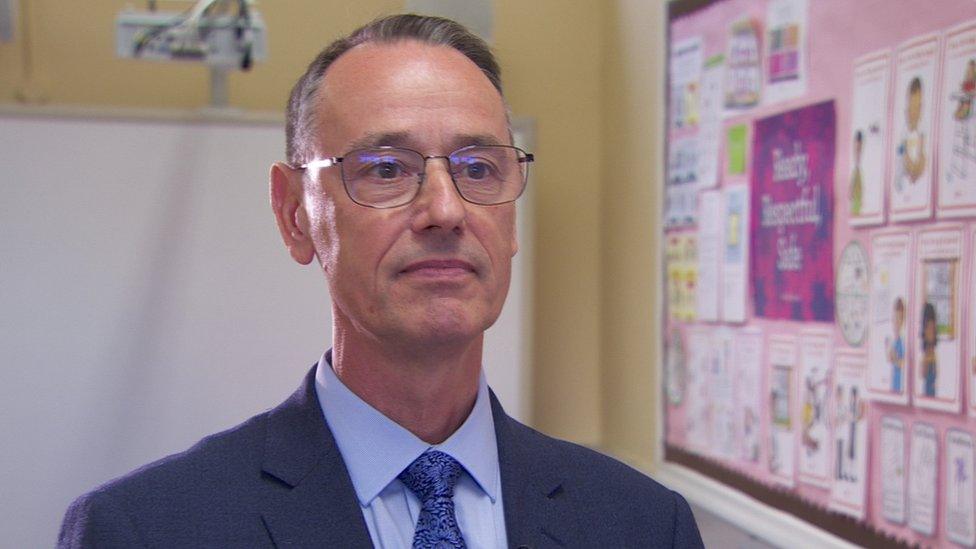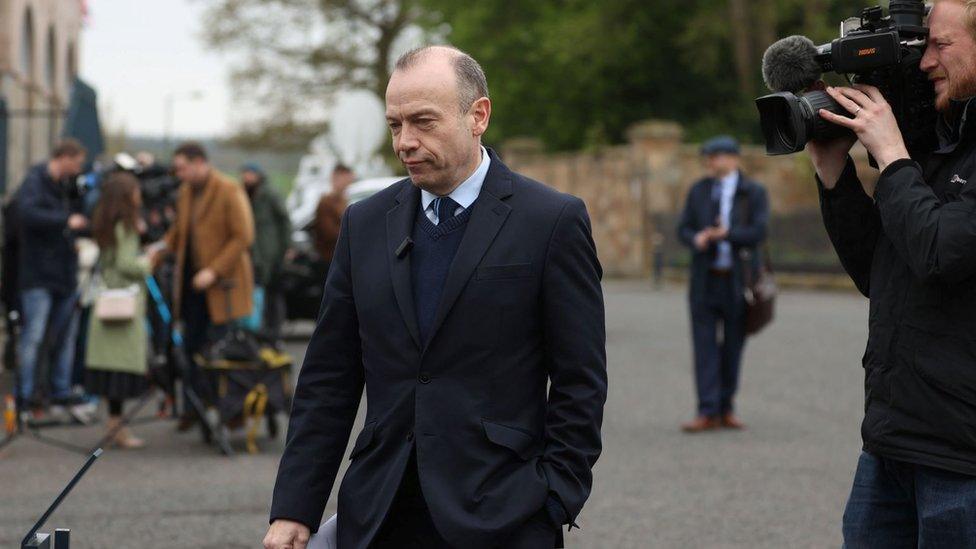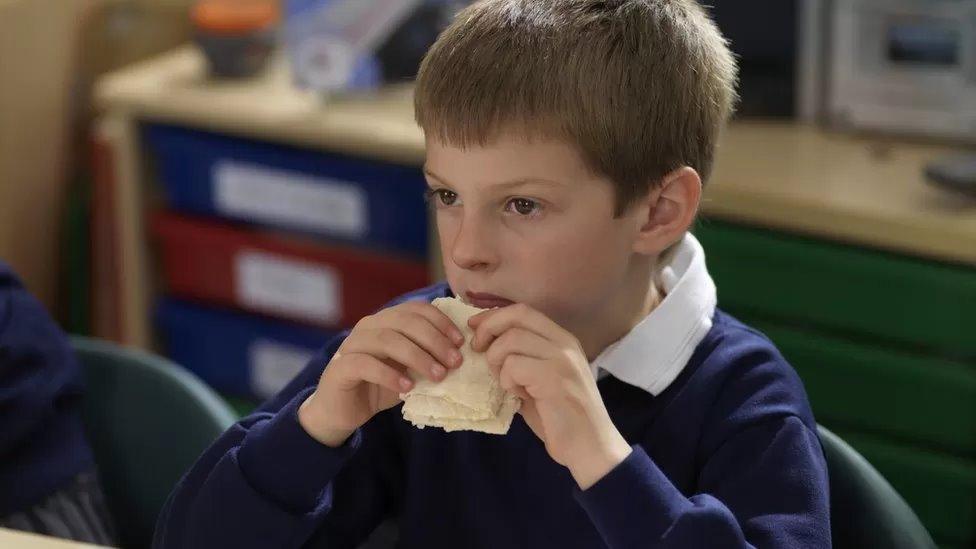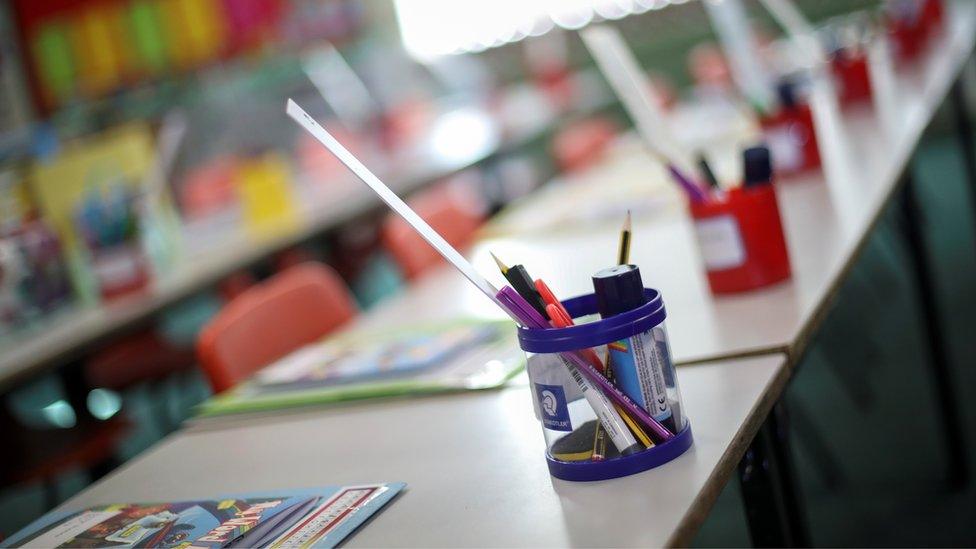Cutting holiday hunger money most difficult decision, says civil servant
- Published
- comments

The education department's brief is currently ran by Dr Mark Browne in the absence of Stormont ministers
Cutting "holiday hunger" payments for children entitled to free school meals was the most difficult decision to make, a senior civil servant has said.
The school holiday grant, designed to help low-income families with the cost of feeding children, was axed in March.
Since July 2020, families of 96,000 children received £27 per child each fortnight during the school holidays.
It comes after the launch of a new academic report criticising "numerous and dramatic" education cuts.
There have been numerous reductions in support for children as the Department of Education tries to make substantial savings.
Some school principals have recently warned that cuts to schools are "dire".
The analysis of the consequences of cuts in education has been compiled by nine academics from four universities.
It said that "short-sighted cuts" risked creating longer-term problems for children, which would increase demand for public services in future.
Education is our 'main business'
Dr Mark Browne, the Department of Education's permanent secretary, was speaking after the report's launch on Tuesday.
He said funding for the scheme had come as an extra earmarked amount to the budget during the Covid-19 pandemic.
"When that stopped, we simply didn't have the money to be able to continue that and we couldn't prioritise that initiative above education, which is what our main business is," he said.
In the absence of a functioning government at Stormont and departmental ministers, department are run by civil servants known as permanent secretaries.
The Northern Ireland Office has said the "decisions required to live within" the £2.57bn budget set for education services rest with Stormont's Department of Education.
But it said the "best way to govern Northern Ireland" was for Stormont politicians to restore devolved government as soon as possible.
The authors call for for the budget to be withdrawn and policy decisions on funding to be made solely by ministers.
The "rapid response" report was written by academics from Queen's University Belfast, Ulster University, Stranmillis University College and Newcastle University.
"This report provides detailed analysis of the consequences of the funding reductions and lack of investment across multiple aspects of education provision in Northern Ireland," it said.
The introduction said it is "intended to inform the general public of the cumulative impact of the ongoing cuts".
Its aim is also "to warn public representatives, officials and the UK and Irish governments of the far-reaching societal impact of this sudden imposition of austerity measures on education provision".

In April Chris Heaton-Harris published a budget for Northern Ireland for this financial year
The analysis covers the impact of funding cuts on a number of areas including early years, support for children in poverty or with special educational needs, mental health support and minority ethnic children.
It also questions why "senior civil servants have been placed in the inappropriate position of having to make significant cuts to provision with little more than ambiguous advice from the Northern Ireland Office".
Funding for education was reduced in the 2023-24 budget set by Northern Ireland Secretary Chris Heaton-Harris.
It was cut by about £66m or 2.5% but the impact of inflation means the real-terms reduction is likely to be much higher.
Dr Browne said that along with other permanent secretaries, he met Mr Heaton-Harris to discuss the implications of various budget scenarios before it was published.
The loss of Covid funding and increased cost-of-living pressures have made for a "particularly difficult" budget, Dr Browne said.
Dr Browne said the department will "bear down on costs" wherever it can, but "it's difficult to see where else we can save money".
There has also been a significant increase in demand for support in some areas, such as school places for children with special educational needs.
The programmes or initiatives cut as a result of the budget "are those that are targeted at children who are in most need and which are designed to increase access to education," said the report.
'Serious consequences'
The report concluded that there would be "far-reaching and serious consequences of the cuts to the education budget".
"Those children who are most disadvantaged will most acutely feel the pain of this budget laid down by the secretary of state," it said.

Experts say officials should take account of the "disproportionate" effect that cuts have on pupils from disadvantage backgrounds
"The authors conclude that the cuts executed will have a devastating impact on those children most vulnerable and furthest from opportunity."
The report included a number of recommendations, including that the 2023-24 Northern Ireland budget "should be withdrawn".
It said that funding for things like the "holiday hunger" payment should be restored and funding for other schemes to help disadvantaged children increased.
The report also said that the department should take account of the "disproportionate" impact that cuts had on pupils from minority ethnic and migrant backgrounds and those living in poverty or from disadvantaged backgrounds.
But the report also calls for more oversight and "political accountability" from Westminster and the Northern Ireland secretary.
"Civil servants should not impose cuts without extensive prior consultation and explicit direction from the secretary of state on proposed departmental spending plans," it said.
It recommended that Mr Heaton-Harris must give guidance on proposed cuts, including consultation with the Irish government and the wider public.
Related topics
- Published17 June 2023

- Published22 June 2023

- Published9 May 2023
